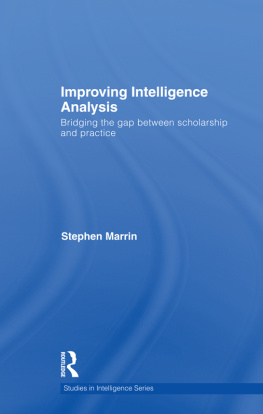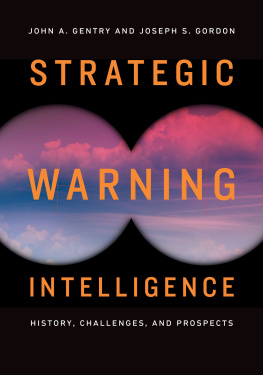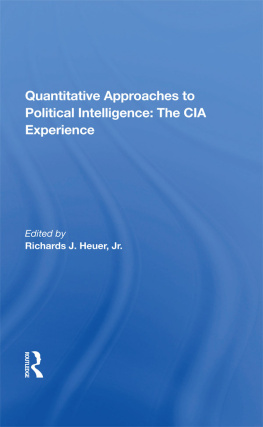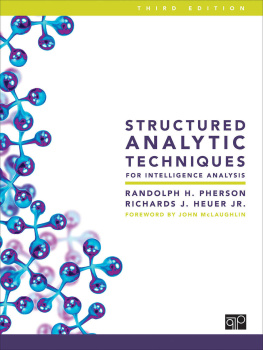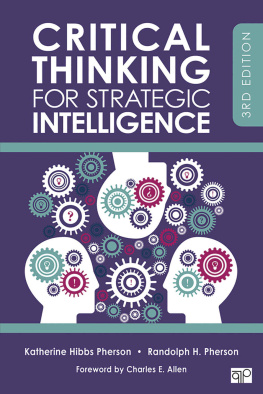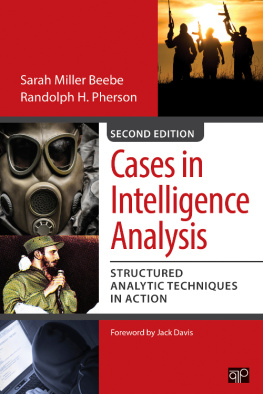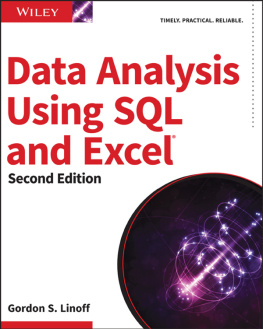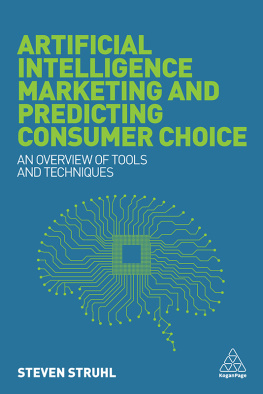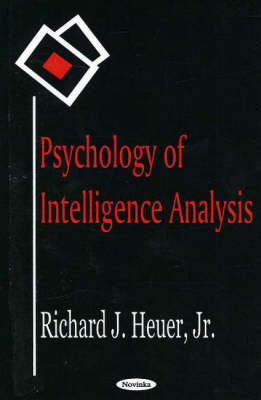More Advance Praise for Structured Analytic Techniques for Intelligence Analysis
Structured Analytic Techniques is an indispensable companion for all analysts and policy-makers who strive to instill transparency, rigor, and foresight into their everyday analytic routines, provide sound argumentation for policy decisions, and avoid surprise. As the authors so vividly point out: Our brain is not always our friend. Good analysis and foresight mean that we need to constantly keep questioning ourselves. This book tells us how to do this in a structured and systematic manner. It is easy to use, practice-oriented, and convinces even sceptics of the necessity of applying structured techniques. The 55 techniques in this book will undoubtedly contribute to advancing foresight and critical thinking skills in Germanys policy community. Randy Phersons extraordinary experience in teaching SATs has already contributed significantly to the training aspects of our efforts to enhance strategic foresight at the federal level in Germany.
Kathrin Brockmann, Head of the Government Foresight Project at the Berlin-based stiftung neue verantwortung and Analyst at the Futures Analysis Section, German Armed Forces Planning Office
A hearty thanks to Heuer and Pherson for writingand updatingthis key work for the aspiring intelligence analystor anyone interested in sound approaches to analyzing complex, ambiguous information. This was the only textbook we considered when developing our Intelligence Analysis Techniques course because it is comprehensive, well-organized, and practical. The second edition has several valuable improvements that will greatly help both instructors and students. Of particular note is the discussion of dual-process thinking and cognitive biases and how structured analytic techniques can help analysts avoid such biases. The second edition should provide an unsurpassed learning opportunity for our students, particularly when used in conjunction with Beebe and Phersons Case Studies in Intelligence Analysis.
Alan More, Adjunct Professor, Intelligence Studies, George Mason University
Competitive Intelligence has been struggling with the Information Cycle for more than two decades. With this book, Richards J. Heuer Jr. and Randolph Pherson are releasing us from the traditional, and mostly intuitive, methods that go with it. They lay the foundation for a new approach to intelligence in business if we take off our blinders and investigate new methods in other fields. It provides an unprecedented and practical baseline for developing a new culture of information sharing in intelligence activities writ large.
Dr. Pascal Frion, President of Acrie Competitive Intelligence Network and 2013 recipient of the French Competitive Intelligence Academy Award
Heuer and Pherson have written a book that provides law enforcement intelligence and crime analysts with numerous techniques to assist in homeland security and crime prevention. The book is a must read for analysts in the law enforcement community responsible for analyzing intelligence and crime data. Analysis of Competing Hypotheses is but one non-traditional example of a tool that helps them challenge assumptions, identify investigative leads and trends, and anticipate future developments.
Major Jesse McLendon (ret.), North Kansas City Police, North Kansas City, Missouri
Heuer and Phersons Structured Analytic Techniques for Intelligence Analysis has become a classic in intelligence literature. Already a standard text in numerous universities and government agencies around the world, the 2nd edition will continue to be required reading for Denmarks current and future intelligence analysts. Its techniques are taught at the University of Copenhagen and the book represents the core literature for analysis simulation exercises, in which graduate students at the Department of Political Science practice the art and science of intelligence analysis under the supervision of senior government intelligence analysts.
Morten Hansen, Lecturer in intelligence studies, Department of Political Science, University of Copenhagen
Heuer and Phersons Structured Analytic Techniques is the standard text for learning how to conduct intelligence analysis. This handbook provides a panoply of critical thinking methodologies suitable to any issue that intelligence analysts may encounter. Used by both government practitioners and intelligence studies students throughout the world, the books techniques have redefined critical thinking.
Dr. Melissa Graves, Associate Director, Center for Intelligence and Security Studies, The University of Mississippi
Heuer and Pherson are the leading practitioners, innovators, and teachers of the rigorous use of structured analytic techniques. Their work stands out above all others in explaining and evaluating the utility of such methods that can appreciably raise the standards of analysis. The methods they present stimulate the imagination, enhance the rigor, and apply to hard intelligence problems as well as other areas requiring solid analysis. This new, expanded edition is a must-have resource for any serious analysts daily use as well as ones professional bookshelf.
Roger Z. George and James B. Bruce, adjunct professors, Center for Security Studies, Georgetown University and co-editors, Analyzing Intelligence: National Security Practitioners Perspectives
The science of reasoning has grown considerably over the past 40-odd years. Among the many fascinating aspects of the human intellect is the ability to amplify our own capabilities by creating analytic tools. The tools in this book are for those whose profession often requires making judgments based on incomplete and ambiguous information. You hold in your hands the toolkit for systematic analytic methods and critical thinking. This is a book you can read and then actually apply to accomplish something. Like any good toolkit, it has some simple tools that explain themselves, some that need explanation and guidance, and some that require considerable practice. This book helps us in our quest to enrich our expertise and expand our reasoning skill.
Robert R. Hoffman, Institute for Human & Machine Cognition

CQ Press, an imprint of SAGE, is the leading publisher of books, periodicals, and electronic products on American government and international affairs. CQ Press consistently ranks among the top commercial publishers in terms of quality, as evidenced by the numerous awards its products have won over the years. CQ Press owes its existence to Nelson Poynter, former publisher of the St. Petersburg Times, and his wife Henrietta, with whom he founded Congressional Quarterly in 1945. Poynter established CQ with the mission of promoting democracy through education and in 1975 founded the Modern Media Institute, renamed The Poynter Institute for Media Studies after his death. The Poynter Institute (www.poynter.org) is a nonprofit organization dedicated to training journalists and media leaders.
In 2008, CQ Press was acquired by SAGE, a leading international publisher of journals, books, and electronic media for academic, educational, and professional markets. Since 1965, SAGE has helped inform and educate a global community of scholars, practitioners, researchers, and students spanning a wide range of subject areas, including business, humanities, social sciences, and science, technology, and medicine. A privately owned corporation, SAGE has offices in Los Angeles, London, New Delhi, and Singapore, in addition to the Washington, D.C., office of CQ Press.

Next page

